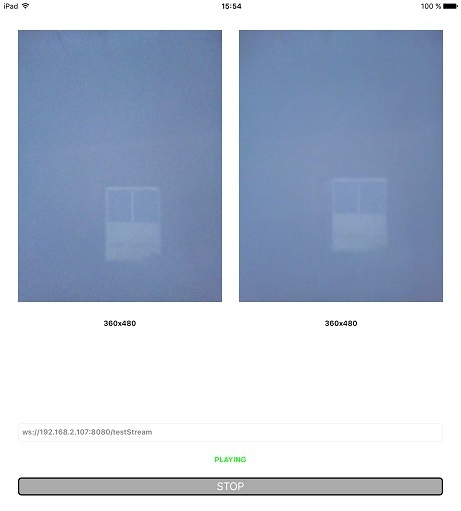Example of streamer for iOS
This streamer can be used to publish WebRTC video stream on Web Call Server.
On the screenshot below the example is displayed when a stream is being published.
In the URL specified in the input field
- 192.168.2.107 is the address of the WCS server
- testStream is the stream name
Two videos are played
- left - video from the camera
- right - the published video stream is played from the server
Work with code of the example
To analyze the code, let's take Streamer example version, which can be downloaded with build 2.5.2.
View class for the main view of the application: ViewController (header file ViewController.h; implementation file ViewController.m).
1. Import of API. code
#import <FPWCSApi2/FPWCSApi2.h>
2. Session creation.
FPWCSApi2 createSession code
The options include:
- URL of WCS server
- appKey of internal server-side application (defaultApp)
FPWCSApi2SessionOptions *options = [[FPWCSApi2SessionOptions alloc] init]; NSURL *url =[[NSURL alloc] initWithString:_connectUrl.text]; options.urlServer = [NSString stringWithFormat:@"%@://%@:%@", url.scheme, url.host, url.port]; streamName = [url.path.stringByDeletingPathExtension stringByReplacingOccurrencesOfString: @"/" withString:@""]; options.appKey = @"defaultApp"; NSError *error; session = [FPWCSApi2 createSession:options error:&error];
3. Connection to the server
FPWCSApi2Session connect code
[session connect];
4. Receiving the event confirming successful connection.
ViewController onConnected code
On this event, ViewController publishStream method is called to publish the stream
- (void)onConnected:(FPWCSApi2Session *)session {
[_connectButton setTitle:@"STOP" forState:UIControlStateNormal];
// [self changeViewState:_connectButton enabled:YES];
[self publishStream];
}
5. Stream publishing.
FPWCSApi2Session createStream, FPWCSApi2Stream publish code
Object with next stream options is passed to createStream method:
- stream name
- view to display video
- video constraints (for iPad for example)
- (FPWCSApi2Stream *)publishStream {
FPWCSApi2Session *session = [FPWCSApi2 getSessions][0];
FPWCSApi2StreamOptions *options = [[FPWCSApi2StreamOptions alloc] init];
options.name = streamName;
options.display = _videoView.local;
if ( UI_USER_INTERFACE_IDIOM() == UIUserInterfaceIdiomPad ) {
options.constraints = [[FPWCSApi2MediaConstraints alloc] initWithAudio:YES videoWidth:640 videoHeight:480 videoFps:15];
}
NSError *error;
publishStream = [session createStream:options error:&error];
...
if(![publishStream publish:&error]) {
UIAlertController * alert = [UIAlertController
alertControllerWithTitle:@"Failed to publish"
message:error.localizedDescription
preferredStyle:UIAlertControllerStyleAlert];
UIAlertAction* okButton = [UIAlertAction
actionWithTitle:@"Ok"
style:UIAlertActionStyleDefault
handler:^(UIAlertAction * action) {
[self onUnpublished];
}];
[alert addAction:okButton];
[self presentViewController:alert animated:YES completion:nil];
}
return publishStream;
}
6. Receiving the event confirming successful stream publishing.
ViewController onPublishing code
On this event, ViewController playStream method is called to play preview stream
- (void)onPublishing:(FPWCSApi2Stream *)stream {
[self playStream];
}
7. Preview stream playback.
FPWCSApi2Session createStream, FPWCSApi2Stream play code
Object with next stream options is passed to createStream method:
- stream name
- view to display video
- (FPWCSApi2Stream *)playStream {
FPWCSApi2Session *session = [FPWCSApi2 getSessions][0];
FPWCSApi2StreamOptions *options = [[FPWCSApi2StreamOptions alloc] init];
options.name = streamName;
options.display = _videoView.remote;
NSError *error;
playStream = [session createStream:options error:nil];
...
if(![playStream play:&error]) {
UIAlertController * alert = [UIAlertController
alertControllerWithTitle:@"Failed to play"
message:error.localizedDescription
preferredStyle:UIAlertControllerStyleAlert];
UIAlertAction* okButton = [UIAlertAction
actionWithTitle:@"Ok"
style:UIAlertActionStyleDefault
handler:^(UIAlertAction * action) {
}];
[alert addAction:okButton];
[self presentViewController:alert animated:YES completion:nil];
}
return playStream;
}
8. Disconnection
FPWCSApi2Session disconnect code
- (void)connectButton:(UIButton *)button {
[self changeViewState:button enabled:NO];
if ([button.titleLabel.text isEqualToString:@"STOP"]) {
if ([FPWCSApi2 getSessions].count) {
FPWCSApi2Session *session = [FPWCSApi2 getSessions][0];
NSLog(@"Disconnect session with server %@", [session getServerUrl]);
[session disconnect];
} else {
NSLog(@"Nothing to disconnect");
[self onDisconnected];
}
} else {
//todo check url is not empty
[self changeViewState:_connectUrl enabled:NO];
[self connect];
}
}
9. Receiving the event confirming successful disconnection.
ViewController onDisconnected code
- (void)onDisconnected {
[_connectButton setTitle:@"START" forState:UIControlStateNormal];
[self changeViewState:_connectButton enabled:YES];
[self changeViewState:_connectUrl enabled:YES];
[self onUnpublished];
[self onStopped];
}
